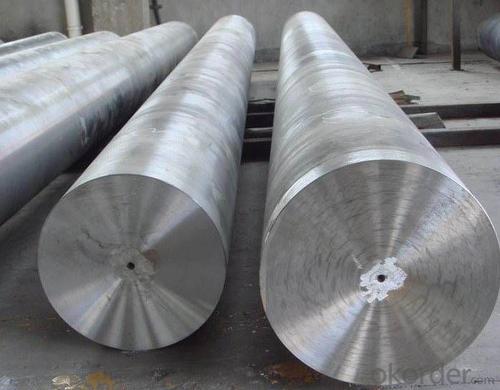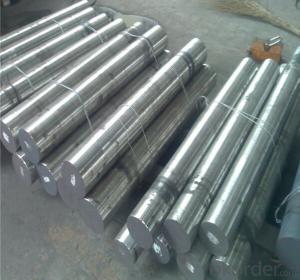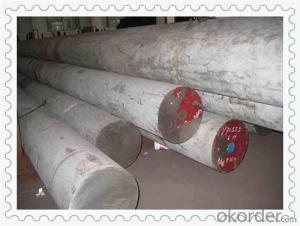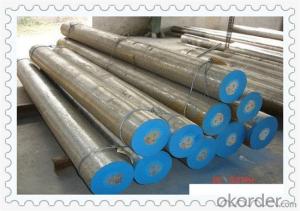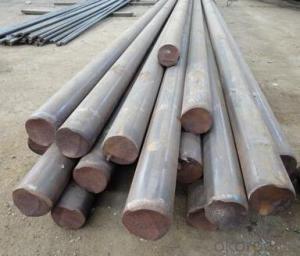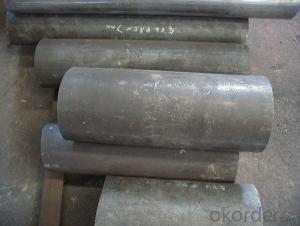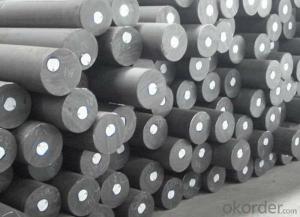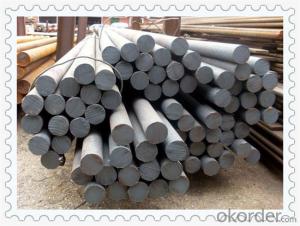AISI 1060 Carbon Steel Sae 1060 Steel Round Bar
- Loading Port:
- Tianjin
- Payment Terms:
- TT OR LC
- Min Order Qty:
- 25 m.t.
- Supply Capability:
- 50000 m.t./month
OKorder Service Pledge
OKorder Financial Service
You Might Also Like
Specification
AISI 1060 Carbon Steel Sae 1060 Steel Round Bar
Product Description:
Carbon steel, stock available in annealed and QT condition.
Flexible MOQ for order.
Delivery 5-10 days.
Good tolerance according the the OD.
Staightness could meet 1mm/M per requirement
Specification:
Round bar | Diameter: 4mm~800mm | |||||
Angle bar | Size: 3mm*20mm*20mm~12mm*800mm*800mm | |||||
Square bar | Size: 4mm*4mm~100mm*100mm | |||||
Flat bar | Thickness: 2mm~100mm | |||||
Width:10mm~500mm | ||||||
Hexagonal | Size: 4mm~800mm | |||||
Length: 2m,4m,5.8m,6m,11.8m,12m or as required. | ||||||
Chemical Composition:
Standard | C | Si | Mn | Cr | Mo | P/S ≤ |
DIN | 0.42-0.60 | 0.4 | 0.50-0.80 | 0.02 | 0.1 | 0.03 |
GB | 0.42-0.60 | 0.4 | 0.50-0.80 | 0.02 | 0.1 | 0.03 |
Characteristic:
General purpose medium carbon steel delivered in as rolled condition. It can be further heat treated to achieve specific mechanical properties. The 0.45% carbon content is not favorable for welding. However, it can be weld with appropriate pre and post weld heat treatment. Surface hardness of 57~62 HRC can be achieved with cast hardening to a depth of approximately 1mm. Used for most transmission and motor parts of medium strength. Case hardened parts such as camshafts, gears, rocking levers etc. Simple hand tools and various types of fasteners and fixtures, machinery parts and components with medium stress.
Product Show:
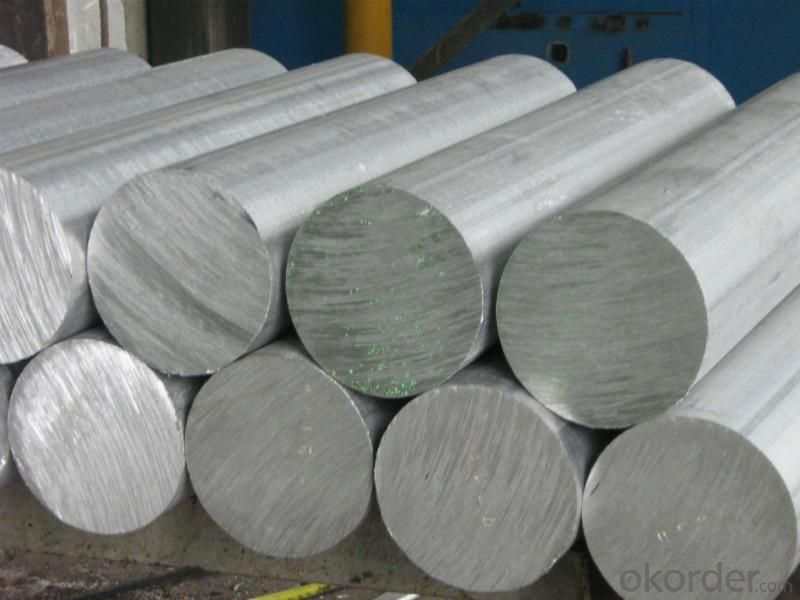
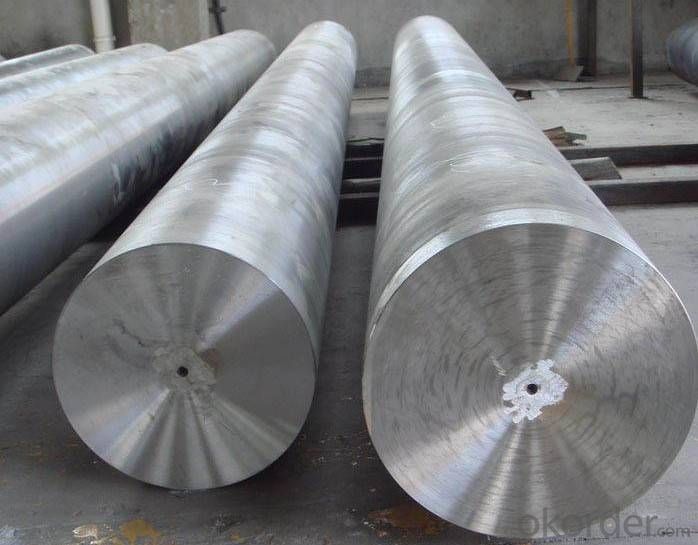
- Q: How is high-temperature steel used in power generation equipment?
- High-temperature steel is used in power generation equipment due to its exceptional heat resistance properties. It is specifically employed in components such as boiler tubes, turbine blades, and exhaust systems, where intense heat and pressure are present. This steel's ability to withstand extreme temperatures ensures efficient energy conversion and maximizes the overall performance and reliability of power generation equipment.
- Q: Can special steel be used for making automotive engine components?
- Yes, special steel can be used for making automotive engine components. This type of steel offers enhanced strength, durability, and heat resistance, making it suitable for critical engine parts such as crankshafts, connecting rods, valves, and camshafts. Special steel helps improve engine performance, efficiency, and longevity, making it a preferred choice in the automotive industry.
- Q: Can special steel be used in the oil and gas industry?
- Yes, special steel can be used in the oil and gas industry. It is often utilized in the construction of pipelines, drilling equipment, and offshore platforms due to its high strength, corrosion resistance, and ability to withstand extreme temperatures and pressures.
- Q: What are the main factors affecting the toughness of special steel?
- The main factors affecting the toughness of special steel are its composition, microstructure, and heat treatment. Composition plays a crucial role in determining the toughness of special steel. The presence of certain alloying elements such as chromium, molybdenum, nickel, and vanadium can enhance the toughness of steel. These elements form solid solutions or precipitates in the steel matrix, which impede the propagation of cracks and improve the material's resistance to fracture. Microstructure also plays a significant role in determining the toughness of special steel. The size, shape, and distribution of the various phases in the steel, such as ferrite, pearlite, bainite, and martensite, affect its toughness. Fine-grained microstructures typically exhibit higher toughness due to their increased resistance to crack propagation. Heat treatment is another essential factor in controlling the toughness of special steel. The process of heating and cooling the steel can modify its microstructure, altering its toughness. Quenching, tempering, and annealing are common heat treatments used to improve the toughness of steel. Quenching and tempering, for example, can produce a microstructure with a desirable balance of hardness and toughness. Other factors that can affect the toughness of special steel include the presence of impurities, non-metallic inclusions, and the presence of residual stresses. Impurities and inclusions can act as stress concentrators and reduce the toughness of the steel. Residual stresses, which can arise during manufacturing processes, can also impact the toughness of the material by creating regions of high stress that can initiate crack formation. In summary, the composition, microstructure, heat treatment, presence of impurities and inclusions, and residual stresses are the main factors affecting the toughness of special steel. Understanding and controlling these factors are crucial for optimizing the toughness and performance of special steels in various applications.
- Q: What are the main factors affecting the impact toughness of special steel?
- The impact toughness of special steel, or any material for that matter, is influenced by various factors. Some of the main factors affecting the impact toughness of special steel are: 1. Composition: The chemical composition of the steel plays a significant role in determining its impact toughness. Elements such as carbon, manganese, silicon, nickel, and molybdenum can be added to enhance the toughness of the steel. Higher carbon content generally improves hardness but reduces toughness, while alloying elements like nickel and molybdenum can enhance toughness. 2. Heat treatment: The heat treatment process, including processes like quenching and tempering, can significantly affect the impact toughness of special steel. Proper heat treatment can refine the microstructure of the steel, making it more resistant to fractures and increasing its toughness. 3. Microstructure: The microstructure of the steel, including the size, shape, and distribution of its grains, greatly impacts its toughness. Fine-grained steels generally exhibit better toughness compared to coarse-grained ones. The presence of certain phases, such as martensite or bainite, can also affect the impact toughness. 4. Inclusions: The presence of non-metallic inclusions, such as sulfides, oxides, or carbides, in the steel can act as stress concentration points and reduce its impact toughness. High-quality special steels often undergo processes like vacuum degassing or electroslag remelting to minimize the presence of these inclusions. 5. Processing conditions: The manufacturing processes used to produce special steel can influence its impact toughness. Factors such as forging, rolling, or extrusion conditions, as well as the cooling rate during solidification, can affect the microstructure and, consequently, the toughness of the steel. 6. Temperature: The impact toughness of special steel also varies with temperature. Some steels exhibit good toughness at low temperatures, while others may have better performance at higher temperatures. The temperature at which the steel is used or tested is an important factor to consider when evaluating its impact toughness. It is worth noting that the impact toughness of special steel is often determined using standardized tests, such as the Charpy or Izod test, which involve subjecting a notched specimen to impact loading. These tests provide valuable information on the material's ability to absorb energy and resist fracture under impact conditions.
- Q: How does special steel perform in hydrogen embrittlement conditions?
- Special steel, known by other names like high-strength steel or alloy steel, possesses remarkable resistance to conditions that cause hydrogen embrittlement. Hydrogen embrittlement occurs when hydrogen atoms infiltrate the metallic lattice structure, causing it to become brittle and prone to fractures when subjected to stress. Given their distinct composition and microstructure, special steels are engineered to endure harsh environments, including those susceptible to hydrogen embrittlement. These steels often contain alloying elements such as nickel, chromium, and molybdenum, which enhance their ability to withstand cracking induced by hydrogen. The presence of these alloying elements in special steel facilitates the development of protective oxide layers on the steel's surface. These layers act as a barrier, preventing hydrogen atoms from diffusing into the metal matrix. Moreover, these elements can capture and bind hydrogen atoms, reducing their mobility and minimizing their negative impact on the steel's mechanical properties. Furthermore, special steels frequently undergo diverse heat treatments and processing techniques, like quenching and tempering, to further enhance their resistance to hydrogen embrittlement. These processes refine the steel's microstructure, enhancing its strength, toughness, and ductility while minimizing the risk of hydrogen-induced cracking. In general, special steel outperforms standard steels in hydrogen embrittlement conditions. Its unique composition, microstructure, and processing techniques make it highly resilient to the detrimental effects of hydrogen atoms. As a result, special steel ensures the structural integrity and reliability of components and structures operating in hydrogen-rich environments.
- Q: How is corrosion-resistant stainless steel used in the production of marine equipment?
- Corrosion-resistant stainless steel is extensively used in the production of marine equipment due to its ability to withstand the harsh corrosive environment of saltwater. It is used for various applications such as shipbuilding, offshore structures, and marine components like propellers, valves, and fittings. The stainless steel's resistance to corrosion helps prevent rust and degradation, ensuring the longevity and durability of marine equipment even in challenging marine conditions.
- Q: What are the different methods of surface tumbling for special steel?
- Special steel can be surface tumbled using various methods, including barrel tumbling, vibratory tumbling, and centrifugal tumbling. To achieve a smooth and polished surface finish, barrel tumbling is commonly employed. This method involves placing the steel parts in a rotating barrel with abrasive media. As the barrel rotates, the steel parts tumble and come into contact with the abrasive media, effectively eliminating burrs, sharp edges, and surface imperfections. Vibratory tumbling, on the other hand, utilizes a vibrating container for surface tumbling special steel. The steel parts are placed in this container along with abrasive media. The vibration causes the steel parts to move and interact with the abrasive media, resulting in the removal of surface imperfections. Vibratory tumbling is often chosen for delicate or complex-shaped steel parts due to its gentler action compared to barrel tumbling. For precise control over the tumbling process, centrifugal tumbling is a specialized method that employs centrifugal force. Steel parts are positioned inside a rotating drum, which is then spun at high speed. The centrifugal force propels the steel parts to move and come into contact with the abrasive media, resulting in the elimination of surface imperfections. Centrifugal tumbling is particularly suitable for smaller or intricate steel parts. In summary, these different methods of surface tumbling offer diverse options for achieving the desired surface finish for special steel. The selection of a method depends on factors such as the size, shape, and delicacy of the steel parts, as well as the desired level of surface finish.
- Q: How is special steel used in toolmaking?
- Special steel is widely used in toolmaking due to its exceptional properties that make it highly suitable for creating durable and high-performance tools. Toolmaking involves the manufacturing of various tools such as drills, saws, cutting tools, dies, and molds, among others. Special steel is utilized in toolmaking to ensure that these tools possess the necessary strength, hardness, toughness, and wear resistance required for their intended applications. One of the primary advantages of special steel in toolmaking is its high strength. Special steel is alloyed with elements such as chromium, molybdenum, vanadium, and tungsten, which enhance its strength and hardness. This enables the tools to withstand heavy loads, resist deformation, and maintain their structural integrity even under extreme working conditions. In addition to strength, special steel also exhibits excellent hardness. Tools made from special steel undergo heat treatment processes such as quenching and tempering to achieve the desired hardness level. This hardness is crucial for toolmaking as it enables the tools to efficiently cut, drill, or shape various materials without getting damaged or worn out easily. Furthermore, special steel possesses exceptional toughness. Toughness refers to a material's ability to absorb energy and resist cracking or fracturing. Tools made from special steel can withstand impact and heavy loads, ensuring that they do not break or chip easily during use. This is particularly important in toolmaking as tools often encounter high-stress situations where toughness is vital to prevent premature failure. Another significant advantage of special steel in toolmaking is its excellent wear resistance. Tools are subjected to constant friction, abrasion, and contact with hard materials, leading to wear and tear. Special steel is specifically designed to resist wear, enabling the tools to maintain their cutting or shaping abilities over extended periods. This not only prolongs the tool's lifespan but also ensures consistent performance and high-quality output. Special steel is also known for its corrosion resistance, which is beneficial in toolmaking, especially when working with corrosive materials or in harsh environments. The inclusion of certain elements like chromium in special steel enhances its resistance to corrosion, preventing rust and deterioration of the tools. In conclusion, special steel plays a crucial role in toolmaking by providing the necessary strength, hardness, toughness, wear resistance, and corrosion resistance. These properties enable the tools to perform effectively and efficiently, ensuring durability and longevity. Whether it is for cutting, drilling, shaping, or molding, special steel is an essential material in the production of high-quality tools that meet the demands of various industries.
- Q: How are copper alloys used in electrical applications?
- Copper alloys are extensively used in electrical applications due to their excellent electrical conductivity and thermal properties. They are used in the production of electrical wires, connectors, and busbars, ensuring efficient transmission of electricity. Copper alloys also offer good corrosion resistance, making them suitable for outdoor and marine electrical systems. Additionally, their high strength and ductility allow for easy fabrication and installation in various electrical components.
Send your message to us
AISI 1060 Carbon Steel Sae 1060 Steel Round Bar
- Loading Port:
- Tianjin
- Payment Terms:
- TT OR LC
- Min Order Qty:
- 25 m.t.
- Supply Capability:
- 50000 m.t./month
OKorder Service Pledge
OKorder Financial Service
Similar products
Hot products
Hot Searches
Related keywords


